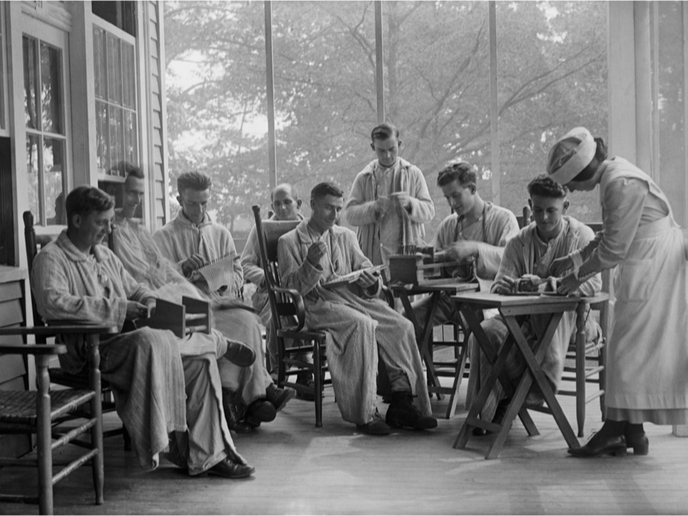Examining gender through the historical experiences of disabled soldiers and their carers
Millions of soldiers lost their lives during the First World War and we remember the fallen every year on 11 November. However, the fates of all the surviving soldiers who returned home, as well as the people who cared for them, are arguably less etched into today’s public consciousness. The responsibility for the physical care of veterans, for example, often fell on female relatives. The European Research Council-funded project MenWomenCare (Men, Women and Care: The gendering of formal and informal care-giving in interwar Britain) has been studying these returnees and has discovered that their experiences were not as grim as one could imagine. “One of the key findings of the project is the extent to which men, even those suffering from serious, long-term and/or highly visible disabilities, were able to reintegrate into the post-war society and economy,” begins Jessica Meyer, the project’s principle investigator and associate professor in modern British history at the University of Leeds. “They were able to successfully negotiate their post-war lives as disabled ex-servicemen with the care and support of family members, community advocates and the State.” These findings have been made possible due to the core aim of the project, namely to create a database of the more than 20 000 personal pension files relating to British ex-servicemen of the First World War, which then allowed for the detailed analysis of the files to examine the care provided to them as they readjusted back into society.
Examining gender through the experience of the war disabled
“For men, disabilities posed serious challenges to their ability to act in what could be described as ‘appropriately masculine’ ways, as domestic providers and as good husbands and fathers,” Meyer says. “These anxieties shaped many of their interactions with the Ministry of Pensions, which was keen to ensure that disabled ex-servicemen achieved as much economic independence as possible.” However, this could cause conflict, due to certain family members being constructed by the Ministry as being ‘nameless dependents’ rather than care providers with their own unique social and emotional needs. “This is best exemplified by the regular note on pension applications to ‘verify wife’, showing that the wife was seen by the Ministry as a nameless object, to be allocated an allowance only if the marriage was properly verified,” explains Meyer. Gender is also significant in relation to the division of labour, where male relatives of disabled ex-servicemen often acted as advocates to the Ministry and provided financial support if needed. Meanwhile, female relatives provided medical care and domestic labour. “The gendered nature of war service also shaped the way in which care was provided,” Meyer adds. “For example, nursing work during the war influenced the caring priorities of the women who ran religious charities which provided care for the disabled after the war.” Whilst definitely having an emphasis on British social history, Meyer points out that the project’s research on domesticity is also relevant beyond the shores of the British Isles, particularly with regards to our understanding of imperial history. Specifically, she points to the effects of war disability on family breakdown in the context of imperial migration from Britain to its colonies.
Translating into modern experience
The work undertaken in the MenWomenCare project has also been applied by Meyer and her team to the experiences of both contemporary British servicemen and disabled people. “We found that the attitudes, language and priorities of the Ministry of Pensions’ medical assessment boards in the post-war period bear direct comparison with the modern agencies currently contracted by the British Government to assess those claiming independence allowances and other benefits,” says Meyer. In fact, Meyer and one of her colleagues, Eilis Boyle, submitted written evidence to the United Kingdom’s Women and Equalities Committee, drawing on their research to argue for ways that families could better be supported as a way of addressing the contemporary crisis in male mental health. Whilst MenWomenCare officially closed at the end of August 2020, Meyer’s medium-term aim is to use her findings from the project to write a monograph on the social and cultural history of war disability in Britain. “Whilst gender relations will feature, the book will also look at life cycle and cultural representations of war disability,” she concludes.
Keywords
MenWomenCare, First World War, gender, soldiers, domesticity, Britain, United Kingdom, carers







